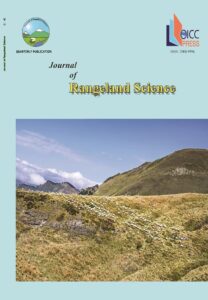Determination of Nutritional Value in Three Forage Species in Three Phonological Stages in Sabalan Rangelands, Ardebil, Iran
Authors
- Abazar Ghanbari 1, 2
- Mahmood Sahraei 3, 4
Abstract
In order to estimate the nutrient value of three dominant range species; Festuca
ovina, Trifolium montanum and Alopecurus textilis via proximate analyses and gas production
technique, samples were collected in three stages during grazing period from 26th May to 1th
September in six areas of Sabalan Mountain in North West of Iran. Results showed that
Trifolium montanum as a legume had higher values for Crude Protein (CP), total ASH,
Organic Matter Digestibility (OMD), Metabolizable Energy (ME) and gas production at 24
hours and showed lower values for ADF (Acid Detergent Fiber) and NDF (Neutral Detergent
Fiber) as compared to two other species that were considered as gramineae. Variation of
quality traits in Trifolium montanum was lower than two other species. The obtained values of
CP, NDF, ADF, ASH, EE, OMD, gas production and Dry Matter (DM) for Trifolium
montanum were 18.65%, 41.83%, 26.97%, 8.95%, 0.26%, 64.50% g/kg and 50.96 ml/200mg,
respectively. For Festuca ovina, they were 9.37%, 68.63%, 36.87%, 6.77%, 0.58%, 53.82%
and 40.04 ml/200mg DM and for Alopecurus textilis, they obtained 5.01%, 73.03%, 42.18%,
5.97%, 0.56%, 55.63 % and 35.46 ml/200mg DM, respectively. The values of ME prediction
that were calculated via Menke equation for Trifolium montanum, Festuca ovina and
Alopecurus textilis were 2.31, 1.93 and 1.75 Mcal/kg DM, respectively. The mean level of
predicted CP, ME and OMD for plants, especially in grasses (Festuca ovina and Alopecurus
textilis) throughout the year, second and third stages of sampling (mid and late summer) and
comparing the nutrient requirements of Moghanian sheep (native breed in Ardabil province)
with these data show that only at early stage of sampling (late spring and early summer), one
can supply sufficient nutrient for domestics whereas the ewes are pregnant at mid and end of
summer and these nutrients are insufficient for them therefore, we have recommended the use
of supplementary feeding in diets of grazing ewes for ideal productivity performance.


